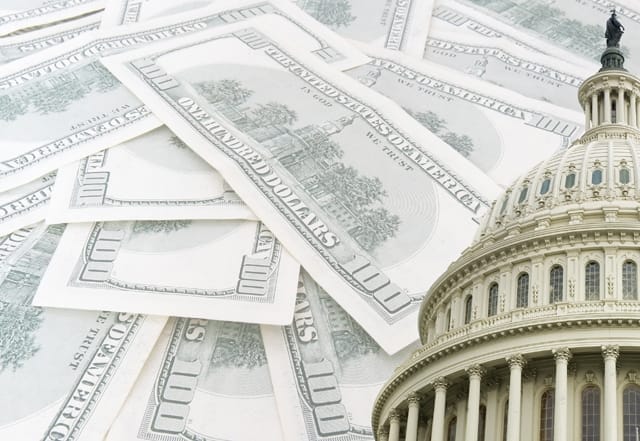About one-third of all state spending today originates in Washington, D.C., dramatically increasing the influence of the federal government on state spending priorities.
His hometown’s experience with a federally funded streetcar project, which is considered a model for Milwaukee’s streetcar, prompted a Portland State University economics professor to look at how much “free” federal grant money actually costs taxpayers.
Eric Fruits reviewed 40 years’ worth of federal grants in aid to states and found that for every dollar received through federal grants, it costs state and local taxpayers about 82 cents, on average, in additional taxes and fees. For Wisconsin taxpayers, it’s even more, paying about $1.34 per federal dollar.
In the study, titled “Impact of Federal Transfers on State and Local Own-Source Spending,” Fruits reviewed federal grants to states from 1972 through 2012 and found that as grant awards have increased, so has state and local spending.
“Each additional dollar in federal transfers is associated with an increase in state and local taxes and fees of 74-88 cents,” Fruits writes in his report. Fruits also is president of Economics International Corp., a Portland-based consulting firm.
Fruits doesn’t offer an explanation of why Wisconsinites pay more than other states. But he says increased spending from states — which includes municipalities, schools, public colleges, as well as state government — primarily follows federal grants in two ways:
- Federal grants often require a matching amount, usually in the form of new spending, from the local/state agency that is receiving the money.
- The state or local agency is saddled with a “maintenance of effort” responsibility, such as maintaining a new road or paying staff to administer the new program or project once the federal money is spent.
The influence of federal dollars on state and local spending has grown exponentially, from $74 billion in 1980 to almost $300 billion in 2012, the most recent data available, Fruits says in his study. As a result, about one-third of all state spending today originates in Washington, D.C., dramatically increasing the influence of the federal government on state spending priorities, he says.
Interest in the effects of federal grant money on state and local finances has increased in recent years with the implementation of the massive American Recovery and Reinvestment Act, or Stimulus, that began in 2008-2009 and which pumped more than $800 billion into state economies, and the Affordable Care Act, or Obamacare, which stands to expand Medicaid payments to states in coming years.
“Our results suggest that the increases in federal grants to state and local governments associated with the ACA’s Medicaid expansion will have significant future tax implications at the state and local level as these governments raise revenue to continue, expand and promote these newly funded programs into the future and as federal support tapers off once the expansion is in place,” Fruits says in his report.
Ironically, Fruits was driven to complete his study partly because of Portland’s downtown streetcar project — generally a model for other cities, such as Milwaukee, considering building a similar system. Portland’s was built initially with the help of a federal grant but now carries an annual operating budget deficit of $4.5 million, forcing the city to divert funds from road repair and maintenance and to consider imposing a 4-cent-per-gallon gas tax to help pay for it.
“Without the federal funds, Portland wouldn’t have a streetcar, which means it would have millions more for road repairs and maintenance, which means it wouldn’t need millions in new taxes to fund road repairs and maintenance. Who would have thought that free federal money could be so expensive?” Fruits said in a telephone interview.
Dan Benson is editor of WPRI’s Project for 21st Century Federalism.





